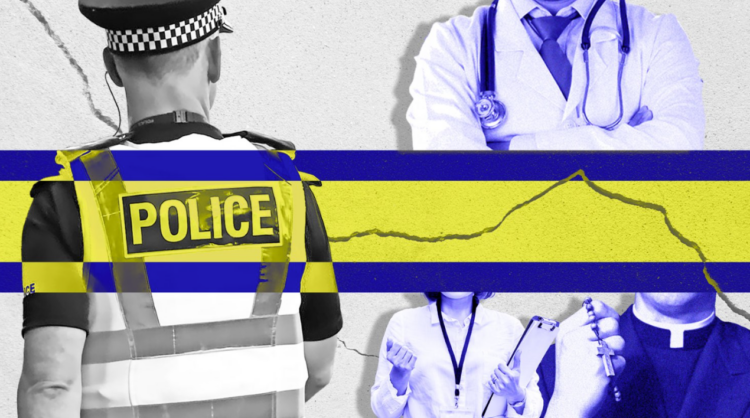Doctors, vicars and social workers have been among the professionals investigated by police over non-crime hate incidents, The Times has disclosed.
Police forces across Britain, responding to freedom of information requests, revealed that hate incidents were being logged against people in authority doing their jobs.
In 2014, the College of Policing came up with the concept of the NCHI in its Hate Crime Operational Guidance (HCOG). As defined in this document, an NCHI is any incident perceived by the victim or any bystanders to be motivated by hostility or prejudice to the victim based on a ‘protected’ characteristic (race or perceived race, religion or perceived religion, and so on).
“Perceived” is the operative word here, since as the guidance goes on to note: “The victim does not have to justify or provide evidence of their belief, and police officers or staff should not directly challenge this perception. Evidence of the hostility is not required.”
In other words, according to the College of Policing, the recording threshold for an NCHI is that someone had taken subjective offence to something perfectly lawful that someone else has said or posted online, whether it’s directed at them or not.
Chillingly, NCHIs can show up on enhanced criminal records checks and stop people getting jobs.
As Lord Macdonald QC, the former Director of Public Prosecutions puts it: “NCHIs have consequences. They are not anonymised. They sit forever against the names of the alleged perpetrators without any real investigation or right of appeal… We need hardly imagine what an HR manager would make of a job applicant with a police history of hate.”
The Times article continues:
A doctor was cited for allegedly misdiagnosing a patient and “a vicar from the local church” was called a “suspect” of a hate incident for saying it was a sin to be gay.
Police data also revealed that someone was the subject of a hate complaint for calling a Welsh victim a “sheep shagger” and another person was reported for asking whether a Chinese meal came “with bats”.
Non-crime hate incidents (NCHIs) are supposed to be reserved for cases “clearly motivated by intentional hostility” with a real risk of escalation “causing significant harm or a criminal offence”. But there was growing unease around the recording of them by police forces last night after The Times reported they had also been lodged against children and journalists.
According to an investigation by The Times, 13,200 NCHIs were recorded by 45 police forces in the 12 months to June this year. It followed updated guidance from Suella Braverman, then the home secretary, which raised the threshold for recording them.
As well as the case of the nine-year-old girl, a journalist’s article about his interview with a “deaf and dumb” scooterist was also reported to the police as a hate incident.
NCHIs were also logged against professionals. One was recorded in West Yorkshire after a person said that their doctors had misdiagnosed them because they were bisexual. Another was recorded by the same force after a man complained that he was not offered a place on a course because he had autism.
West Yorkshire police said it was “committed to recording every hate incident, whether or not it passes the threshold to be classified as a crime”. It said that the rules on NCHIs required an officer to apply their judgment “to establish that there is hostility towards a protected characteristic group”.
In Humberside, a vicar was called a “suspect” in a hate incident report for saying to a victim that it was a sin to be gay, causing them “to feel alarmed and distressed”.
A Humberside police spokesman said that the force carefully assessed each case, including establishing vulnerabilities “or if there is any wider risk to those involved”. They added that the force worked to take a “common-sense and proportionate approach”.
A social worker was reported to the police in Lancashire over claims she had abused her position and racially discriminated against the victim by preventing her from seeing her children. She had also failed to pass on gifts to them, the NCHI report said.
Lancashire police said it adhered to the Home Office code of conduct and had introduced guidance and training to staff.
Other reasons for recording hate incidents appeared to be for causing offence. One person was reported to Norfolk police in a NCHI for calling a Welsh person a “sheep shagger”. Norfolk police said there were “challenges” in interpreting the new NCHI rules but that it was training its frontline staff.
In Humberside, a hate incident was recorded after a man asked whether a woman’s Chinese restaurant food came “with bats”.
Another person complained to police that he had been removed from a friendship social media group because he was “too much and exhausting”. He believed it was because he was autistic.
Surrey police logged a hate incident after a couple were asked to leave a pub upon being accused of having sex in the establishment’s toilets. The force said one of the couple was transgender and it was alleged that the actions taken by the pub were “hate-related”. It maintained that the NCHI was correct.
In south Wales a lesbian couple believed they were targeted with a dead rat on their doorstep. They conceded that rats were common but claimed it had looked “placed”.
South Wales police said its policy for recording and dealing with non-crime hate incidents is subject to continuous review and was designed with the aim of “ensuring a fair and proportionate way of dealing with those involved”.
In May this year a woman in West Yorkshire reported an NCHI after finding a dead pigeon outside her house. She had already been engaging with the force as a victim of alleged harassment and a hate incident was recorded on the basis of disability.
Worth reading in full.






